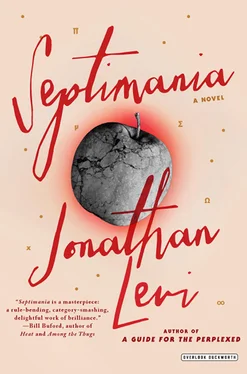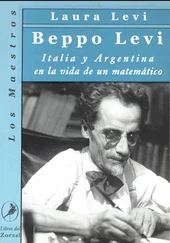Louiza knew there was something alive inside her by the gradual swell and the occasional rumble. But whatever the something was, it shared its mother’s ability to lose itself in concentrated activity and generate few ripples. Summer turned to autumn. A heavier duvet appeared on Louiza’s bed along with a set of jacket-length knit cardigans that easily camouflaged her metamorphosis.
Until the morning of the kick.
Louiza had finished her egg and had just ascended the stairs to her room with fresh problems and a second cup of tea, when she felt the kick. More than a kick, it was a full-fledged riot that pulled her stomach towards the window, leaving a wake of spilled tea and damp papers. She had felt the baby’s presence before, but more as friendly companionship. Now it was announcing itself as an independent life, urging her closer to the window, forcing her to put down her tea cup and take a look outside towards the river.
“Malory!” she said. There he was, the little man from the organ loft. He was on the towpath by the river, wearing the same brown corduroy jacket, with the same military bag slung across his shoulder, atop a bicycle. Or, rather, under. Malory had fallen off.
IT WAS ONLY A FEW HOURS EARLIER THAT MALORY HEARD HIS OWN KNOCKING. Waking from a rare, dreamless sleep, he thought that the knock belonged to Louiza, who had found him, who had observed his quest and finally deemed him worthy of rescue.
“Mr. Malory?” No, the fruity baritone was not Louiza. “Rix, sir. I’ve brought your breakfast.”
“What time is it?” Malory opened the door to the porter. The electric light was still on in the stairwell, and the small window that opened onto the Great Court of Trinity was too full of the greasy residue of some ambitious fresher’s late-night grill to give much of a clue.
“Just gone seven, Mr. Malory,” Rix said, the tray of tea and scone balanced on his left hand. “A telephone call in the Porters’ lodge, just now,” Rix continued.
“Breakfast?” Malory said.
“Rather urgent, sir. The vicar, St. George’s Church, Whistler Abbey. Very sorry to bother, but he wondered whether you might play a service this morning.”
“This morning?” Malory’s left eye was just beginning to open.
“In one hour, eight o’clock.”
“Ring him back and say you couldn’t find me. Please.” Malory turned to close the door.
“He was quite insistent.” The tray was inside his rooms. Malory was forced to retreat as Rix set it down and poured him a cup. Malory wasn’t particularly fond of the vicar at the best of times and was still shrouded in the disappointment of finding Rix rather than Louiza outside his door. But his inability to offend gave him the energy to pull on yesterday’s clothing as Rix buttered his scone — there was no need for fancy dress; he’d be up in the loft, hidden by the balustrade and a robe — brush his teeth and do his best with his hair, grab his corduroy jacket and Kit Bag, and stumble to the door.
“And Mr. Malory.” Rix handed him the scone with one hand and slid an envelope into the outer breast pocket of his jacket. “This came for you. From the Master.” Another dinner. Malory chewed and stumbled towards the bicycle shed. More Americans at High Table.
Malory pushed his bicycle through the arch of the college, beneath the gaze of Henry VIII holding a leg of mutton or a scepter in his stony hand. The light was graying towards eight o’clock by the time he reached the towpath by the river. It was that hopeful hour of dawn that encouraged him to rise each morning and resume his search for Louiza, as he had every morning for the past seven months. Louiza’s disappearance had coincided with the Easter Holiday, which emptied Cambridge of any student or fellow with even half a family and a lamb chop. Malory stayed if not happily then with determination in the depopulated cave of Trinity College, intent on pushing the rock of his stupidity up the cobbled slope of his loss. But his search for clues in the shadows and echoes of the new spring turned up only a lost Iranian student or a freshly widowed fellow, caught in the perplexed limbo of embarrassment and grief. As Easter Term led through the May Balls of June into the empty twilights of summer, Malory paid regular visits to the Maths Faculty and Antonella’s teakettle. Although every time he did, it seemed that Antonella’s beloved Rome had suffered another disaster.
At the beginning of May, Aldo Moro was discovered lying on his back in the boot of a cherry Renault 4 behind the Caetani Palace — dead, shot ten times. Pope Paul VI’s death in early August didn’t release an equal flow of tears but still provoked in Antonella the terror of a fast-approaching Day of Judgment. And when the newly crowned Smiling Pope John Paul I failed to awake on September 28 after only thirty-three mornings on the throne of St. Peter, Malory had to spring for a pair of kebabs and half a carafe of retsina at the Eros for the poor, distracted Italian girl.
Of course, there were quieter, less dramatic times with Antonella, when she would pull a shoebox of photos and postcards from a Heffers carrier bag and give Malory a guided tour of her Rome, from the mosaics in Santa Prassede to the oak-paneled door of the Basilica of Santa Sabina, where Antonella had spent much of her girlhood in battle with the Dominican nuns. Malory’s favorites were the frescoes in the Carafa Chapel of Santa Maria sopra Minerva.
“There was an ugly cardinal,” Antonella told Malory, opening up her biscuit tin. “I mean really ugly. Bruttissimo , as ugly as a mathematician. Sorry,” she said immediately, but Malory the Historian of Science couldn’t imagine why she would apologize, since calling Louiza something as simple as a mathematician had never occurred to him. “Cardinal Carafa hired a poor Tuscan bastard named Lippi to decorate the family chapel.” Antonella propped three postcards up against the tin. St. Thomas Aquinas seemed — as best as Malory could tell — to be the subject of each one: a pale man in a dun-colored cloak, who was overly familiar with the insides of the biscuit tin. “My favorite,” she said, picking up one card between two magenta nails, “is the Annunciazione .”
Antonella was correct. The cardinal was ugly. The patron behind every Annunciation always got pride of place, kneeling before the Virgin. But the patron kneeling in the scarlet robes, with little hair and an unfortunate nose, must have been truly hideous if this was how Lippi had idealized him. Aquinas stood behind Carafa, introducing him to the Virgin Mary, while a Florentine angel frantically tried to point out to the young lady that the Holy Spirit was on the cusp of bringing her some very good news.
“But see how the Virgin tells the angel to wait,” Antonella said to Malory, “like that news lady you like so much on the BBC—”
“Anna Ford?” Malory looked at Lippi’s virgin and thought, in fact, how much more she reminded him of Louiza than of the Italian with the biscuit tin or the British rose of the TV screen. The pale skin, the wheaten hair, the eyes turned down below nearly invisible eyebrows, as Louiza turned down hers when she announced the formula that won her the PhD and the everlasting devotion of Malory.
Malory accepted Antonella’s hand across a biscuit tin, her arm in the Arts Cinema as a fair trade for her help in his quest for Louiza. And as it was, Antonella uncovered quite a bit, even if Malory was uncertain how to interpret the discoveries. Malory hadn’t disclosed any of the more tender portions of his afternoon with Louiza. But he had shared with Antonella the academic characteristics of Louiza’s work, chief among them, of course, the equation i = u. Familiar as she was with the form if not the substance of the work of her mathematical charges, Antonella immediately recognized the complexity condensed within that simple equation.
Читать дальше












